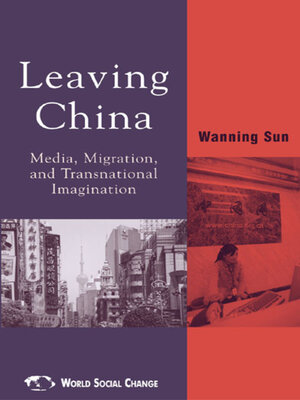Leaving China
ebook ∣ Media, Migration, and Transnational Imagination · World Social Change
By Wanning Sun

Sign up to save your library
With an OverDrive account, you can save your favorite libraries for at-a-glance information about availability. Find out more about OverDrive accounts.
Find this title in Libby, the library reading app by OverDrive.



Search for a digital library with this title
Title found at these libraries:
| Library Name | Distance |
|---|---|
| Loading... |
More than ever before, China is on the move. When the flow of people and images is fused, meanings of self, place, space, community, and nation become unstable and contestable. This fascinating book explores the ways in which movement within and across the national borders of the PRC has influenced the imagination of the Chinese people, both those who remain and those who have left. Travelers or no, all participate in the production and consumption of images and narratives of travel, thus contributing to the formation of transnational subjectivities.
Wanning Sun offers a fine-grained analysis of the significant narrative forms and discursive strategies used in representing transnational space in contemporary China. This includes looking at how stay-at-homes fantasize about faraway or unknown places, and how those in the diaspora remember experiences of familiar places. She considers the ways in which mobility-of people, capital, and images-affects localities through individuals' constructions of a sense of place. Relatedly, the author illustrates how economic, social, and political forces either facilitate or inhibit the formation of a particular kind of transnational subjectivity.
Wanning Sun offers a fine-grained analysis of the significant narrative forms and discursive strategies used in representing transnational space in contemporary China. This includes looking at how stay-at-homes fantasize about faraway or unknown places, and how those in the diaspora remember experiences of familiar places. She considers the ways in which mobility-of people, capital, and images-affects localities through individuals' constructions of a sense of place. Relatedly, the author illustrates how economic, social, and political forces either facilitate or inhibit the formation of a particular kind of transnational subjectivity.







